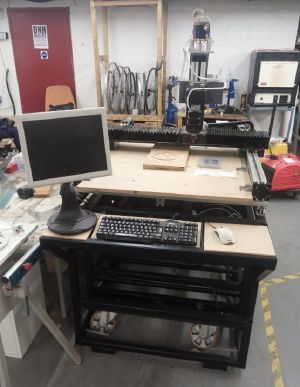Gantry CNC: Difference between revisions
No edit summary |
No edit summary |
||
| Line 24: | Line 24: | ||
== Specs == | == Specs == | ||
* Spindle 1750 to 17500rpm | * Spindle | ||
* Rapid traverse rate at 100% 2000mm/min | ** Perske VS50.09 (see http://crpperske.com/pdf/Perske_Catalog_25AM.pdf) | ||
** 1750 to 17500rpm | |||
** 2.2kW driven by Siemens Micromaster 420 VFD | |||
** ER20 extension collet chuck fitted | |||
* Rapid traverse rate at 100% 2000mm/min (currently derated to 1200mm/min Jan 2016) | |||
* Axis travel | * Axis travel | ||
** X(cross) 850mm | ** X(cross) 850mm | ||
** Y(longitudinal) 960mm | ** Y(longitudinal) 960mm | ||
** Z(vertical) 80mm (Phase 1), 200mm (Phase 2) | ** Z(vertical) 80mm (Phase 1), 62mm clear of current spoilboard, 200mm (Phase 2) | ||
== Technical == | == Technical == | ||
Revision as of 14:12, 9 January 2016
Summary
This system can cut 2d and 3d shapes from materials such as wood, plastic, metal and composites. It is useful for cutting things that can't be cut in the laser cutter due to their thickness or material compatibility. The edge accuracy of parts is also usually better than a laser cut due to the lack of uncertainty about the kerf width, and improved vertical walls.
We made this CNC from the UCL donated linear slides and stages, and other things lying around the space, and some bits and pieces that members had. Any suggestions for improvements / modification are welcome.
Specs
- Spindle
- Perske VS50.09 (see http://crpperske.com/pdf/Perske_Catalog_25AM.pdf)
- 1750 to 17500rpm
- 2.2kW driven by Siemens Micromaster 420 VFD
- ER20 extension collet chuck fitted
- Rapid traverse rate at 100% 2000mm/min (currently derated to 1200mm/min Jan 2016)
- Axis travel
- X(cross) 850mm
- Y(longitudinal) 960mm
- Z(vertical) 80mm (Phase 1), 62mm clear of current spoilboard, 200mm (Phase 2)
Technical
The system currently runs LinuxCNC on the PC built into the base.
Using the system
- The spindle is currently fitted with an ER20 collet chuck and can take cutters up to 13mm diameter. Collets can be found on top of the Boxford CNC.
- To start the spindle, press the green button on the VFD. Use the up and down keys to vary the speed.
Generating g-code from your designs
There are a lot of different options for preparing a g-code file which can be loaded onto the CNC to cut a design. Some examples include;
2D Packages
- MakerCam (Free, runs in a browser via Flash) http://www.makercam.com/makercam.swf
- Cambam (LHS has a license, installed on the Robotics CAD/CAM laptop) http://www.cambam.info/
3D Packages
- Autodesk Fusion 360 (Free for hobbyists and students, Windows / OSX) http://www.autodesk.co.uk/products/fusion-360/overview
When using Fusion 360, in order to post to the Hackspace CNC machines, the "Generic EMC2" post-processor should be selected when finally saving the g-code file. LinuxCNC recognises the "ngc" file extension although any extension can be used.
System status
The system is up and running in 'alpha' status - it can be used for projects, although we are still doing some tidying and adjusting of subsystems based on initial experiences of people using it in the alpha/beta program. A low noise vacuum cleaner has been installed as a dust extraction system.
Training
The system is currently in an "alpha" state - if you would like to get trained to do a specific job you have in mind, on the understanding that you may find issues along the way (which helps us too!) you can email the Robotics mailing list to arrange a time for training. You will find this easiest if you take a look at one of the recommended packages above (or your own choice of package, we will try to accomodate).
